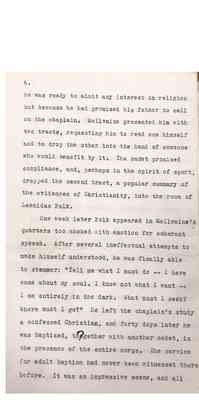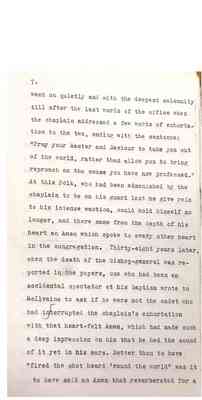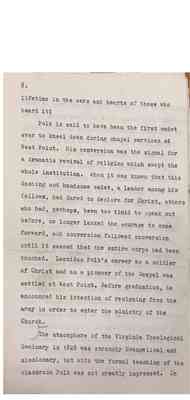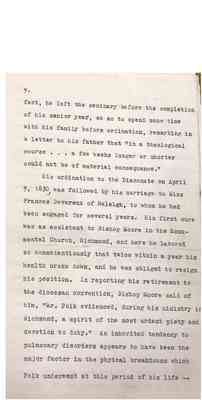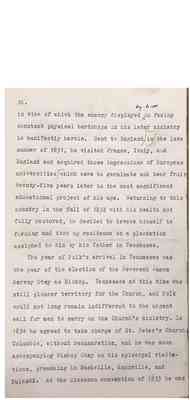Pages That Mention Polk
Polk Family Papers Box 1 Document
7
-6-
he was ready to admit any interest in religion but because he had promised his father to call on the chaplain. McIlvaine presented him with two tracts, requesting him to read one himself and to drop the other into the hand of someone who would benefit by it. The cadet promised compliance, and, perhaps in the spirit of sport, dropped the second tract, and popular summary of the evidences of Christianity, into the room of Leonidas Polk.
One week later Polk appeared in McIlvaine's quarters too choked with emotion for coherent speech. After several ineffectual attempts to make himself understood, he was finally able to stammer: "Tell me what I must do -- I have come about my soul. I know not what I want -- I am entirely in the dark. What must I seek? Where must I go?" He left the chaplain's study a confessed Christian, and forty days later he was baptized, together with another cadet, in the presence of the entire corps. The service for adult baptism had never been witnessed there before. It was an impressive scene, and all
8
-7-
went on quietly and with the deepest solemnity till after the last words of the office when the chaplain addressed a few words of exhortation to the two, ending with the sentence: "Pray your Master and Saviour to take you out of the world, rather than allow you to bring reproach on the cause you have now professed." At this Polk, who had been admonished by the chaplain to be on his guard lest he give rein to his intense emotion, could hold himself no longer, and there came from the depth of his heart an Amen which spoke to every other heart in the congregation. Thirty-eight years later, when the death of the bishop-general was reported in the papers, one who had been an accidentl spectator at his baptism wrote to McIlvaine to ask if he were not the cadet who had interrupted the chaplain's exhortation with that heart-felt Amen, which had made such a deep impression on him that he had the sound of it yet in his ears. Better than to have "fired the shot heard around the world" was it to have said an Amen that reverberated for a
9
-8-
lifetime in the ears and hearts of those who heart it!
Polk is said to have been the first cadet ever to kneel down during chapel services at West Point. His conversation was the signal for a dramatic revival of religion which swept the whole institution. When it was known that this dashing and handsome cadet, a leader among his fellows, had dared to declare for Christ, others who had, perhaps, been too timid to speak out before, no longer lacked the courage to come forward, and conversion followed conversion until it seemed that the entire corps had been touched. Leonidas Polk's career as a soldier of Christ and as a pioneer of the Gospel was settled at West Point. Before graduation, he announced hhis intention of resigning from the army in order to enter the ministry of the Church.
The atmosphere of the Virginia Theological Seminary in 1828 was strongly Evangelical and missionary, but with the formal teaching of the classroom Polk was not greatly impressed. In
10
-9-
fact, he left the seminary before the completion of his senior year, so as to spend some time with his family before ordination, remarking in a letter to his father that "in a theological course ... a few weeks longer or shorter could not be of material consequence."
His ordination to the Disconate on April 9, 1830, was followed by his marriage to Miss Frances Devereux of Raleigh, to whom he had been engaged for several years. His first cure was as assistant to Bishop Moore in the Monumental Church, Richmond, and here he labored so conscientiously that twice within a year his health broke down, and he was obliged to resign his position. In reporting his retirement to the diocesan convention, Bishop Moore said of him, "Mr. Polk evidenced, during his ministry in Richmond, a spirit of the most ardent piety and devotion to duty." An inherited tendency to pulmonary disorders appears to have been the major factor in the physical breakdowns which Polk underwent at this period of his life --
11
-10-
in view of which the energy displayed by him in facing constant physical hardships in his later ministry is manifestly heroic. Sent to England in the late summer of 1831, he visited France, Italy, and England and acquired those impressions of European universities which were to germinate and bear fruit twenty-five years later in the most magnificent educational project of his age. Returning to this country in the fall of 1832 with his health not fully restored, he decided to devote himself to farming and took up residence on a plantation assigned to him by his father in Tennessee.
The year of Polk's arrival in Tennessee was the year of the election of the Reverend James Hervey Otey as Bishop. Tennessee at this time was still pioneer territory for the Church, and Polk could not long remain indifferent to the urgent call for men to carry on the Church's ministry. In 1834 he agreed to take charge of St. Peter's Church, Columbia, without remuneration, and he was soon accompanying Bishop Otey on his episcopal visitations, preaching in Nashville, Knoxville, and Pulaski. At the Diocesan convention of 1835 he was
